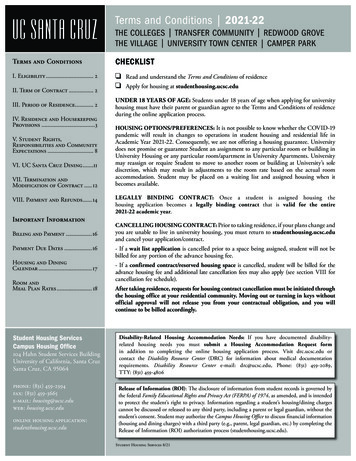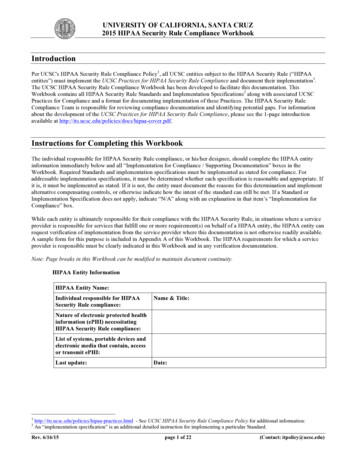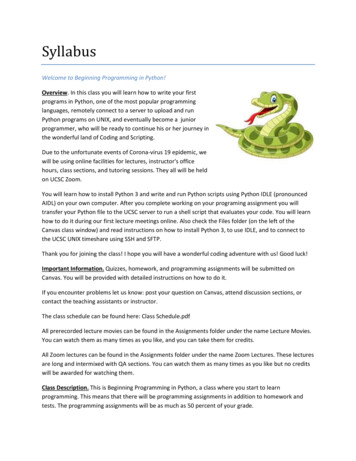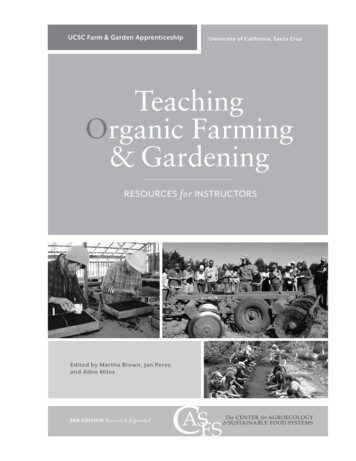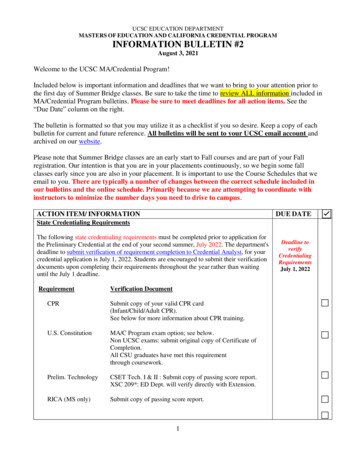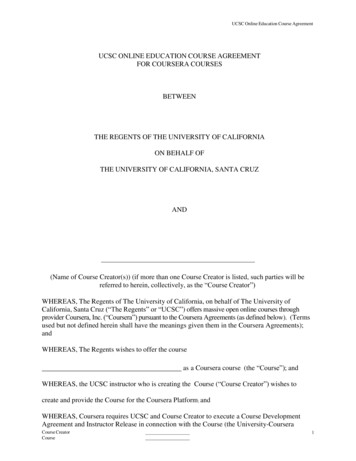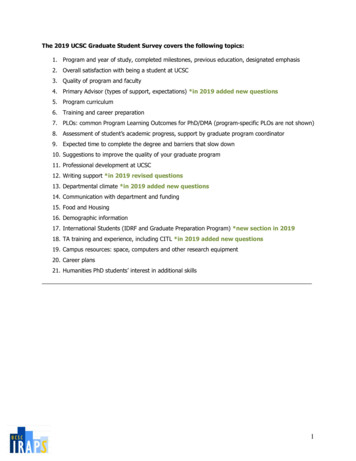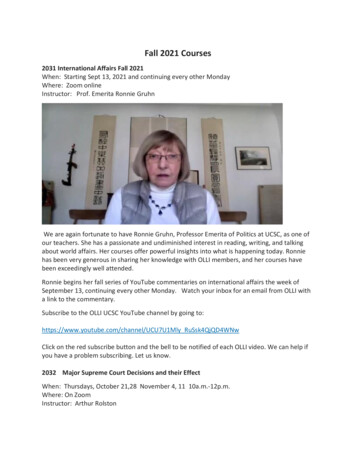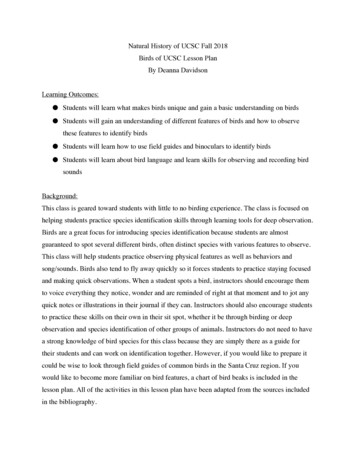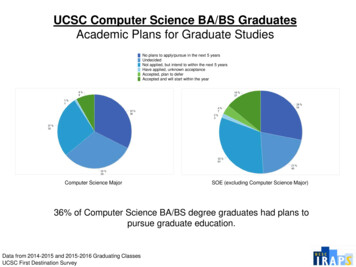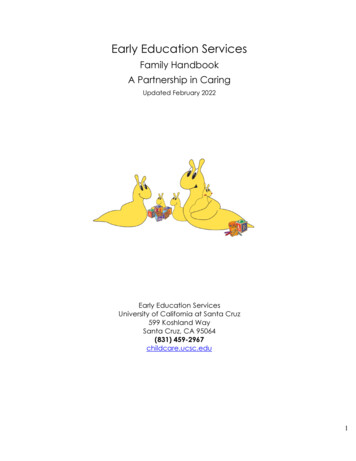
Transcription
Early Education ServicesFamily HandbookA Partnership in CaringUpdated February 2022Early Education ServicesUniversity of California at Santa Cruz599 Koshland WaySanta Cruz, CA 95064(831) 459-2967childcare.ucsc.edu1
Table of ContentsEES Phone Numbers2Mission Statement & Program Philosophy3Overview4Staff6Meals6-7How to Qualify for the Program7Enrollment Process8Daily Schedules & Program Centers12-13Health & Safety14-15Illness Policy16Emergency Plans17-18Mandated Reporter Information19Positive Guidance Discipline Policy20General Policies22Termination Policies25Early Education Services Phone NumbersEES ADMINISTRATIVE STAFFEES Main Officeearlyeducation@ucsc.eduEES Main Office FAX459-2967459-5222EES Director: Emili Willetiwillet@ucsc.edu459-4073EES Program Site Supervisor: Alison Steinbergalmstein@ucsc.edu459-3013EES Enrollment Coordinator: Paulette Carneyplcarney@ucsc.edu459-3396EES Business Coordinator: Alex Ferreyrajf51698@ucsc.edu459-5980INFANT /TODDLER CENTERInfant/Toddler Center Classroom459-3344Infant Center Teacher Message Phone429-5660PRESCHOOL CENTERPreschool Room459-4088SCHOOL AGE CENTERSchool Age Classroom459-44722
UCSC Child Care Services Mission StatementThe mission of Child Care Services is to promote access to higher education through provision ofaffordable, accessible, quality developmental childcare for university families. We assist families in reachingtheir educational and career goals particularly non-traditional, underrepresented, and at-risk students;support diversity, and productivity; and support the university’s research, teaching, and community servicegoals.We provide child care services and programs to attract, serve and retain a diverse population of studentsby serving those of low-income and others for whom lack of child care is a barrier to education.We provide high quality affordable and accessible childcare.We provide an educational program that is culturally and developmentally appropriate for the childrenserved, which facilitates children’s physical, cognitive, social and emotional growth.We provide family education, family support services, and family involvement opportunities.We provide nutrition, health and social services, community involvement, developmental assessment, andstaff development components as required by the State Department of Education.We provide a strong recruitment vehicle for the university by attracting nontraditional andunderrepresented students, and increasing retention of these and other at-risk students.We provide meaningful employment and training opportunities to students who support themselves whileachieving their education.We provide field research and observation opportunities for students to accommodate the instructional,research, and service interests of academic divisions.We support positive university relationships with the greater Santa Cruz community by helping to addressthe shortage of quality, affordable childcare in the Santa Cruz area, particularly infant, toddler,kindergarten after-school, and school age care.Program Philosophy, Goals & ObjectivesPhilosophyEES is dedicated to providing the highest quality developmental care possible in a secure, homelikeenvironment characterized by warmth, affection, and support. We believe that children learn through playand exploration while engaged in relationships with peers and responsive, caring adults. We nurture allaspects of a child’s development: cognitive, emotional, social, creative, and physical. Individuality isacknowledged and respected, as children are encouraged to develop skills in decision-making and socialinteraction.Children play an important role in our curriculum development We build on the expressed interests andideas of children and their families to create a continuously developing and exciting curriculum.Learning is a balance of independent exploration and teacher-directed activity, carried out at the child’sown pace.We believe that caring and education are inseparable. Children need to feel comfortable and secure, toknow what is expected of them, and to have opportunities to express themselves. Adults in our programestablish positive personal relationships with children to effectively foster development.Children learn in the greater context of their families and community. Family involvement positivelyreinforces each child’s family traditions and culture. EES creates a culturally stimulating, accepting, andnurturing setting in collaboration with families. We share in the rearing of our community’s children in thespirit of respect and cooperation, characterized by effective communication, and shared decisionmaking.3
EES has a zero tolerance for abuse philosophy. Authorized family members of enrolled children mayobserve our programs at any time without prior notice.All of our programs are licensed and administered under Title 22 regulations of the State of California, andTitle V Terms under the Department of Education. EES receives State Department of Education funds,Student Registration Fees, Housing Auxiliary Funds, Student Referendum Fees, and Family Fees. This fundingenables us to provide free or low-cost care for qualifying families.OverviewNondiscrimination PolicyEarly Education Services programs are open to all families without regard to race, color, national origin,gender, religion, age, physical or mental ability, political beliefs, sexual orientation, or marital or family status.We refrain from religious instruction or worship. We are committed to making all reasonable accommodationsto meet every child’s needs. Please call 459-2967 or email earlyeducation@ucsc.edu if you requirealternative means for communication of program information (Braille, large print, audio tape, etc.) or if youneed disability-related accommodations to visit us. No optional or supplementary services are offered.Anti-bias CurriculumBetween the ages of two and five, children become aware of differences in gender, race, ethnicity, andabilities. They are also sensitive to the attitudes (both positive and negative) that family and society attach tothese differences. EES embraces age-appropriate anti-bias curriculum that reflects the diversity of ourcommunity and world which conveys complete respect for ethnicity, gender, age, class, family structure, andphysical ability. Our goal is to create a learning environment where each child develops a strong personalidentity, feelings of comfort with diversity, the ability to talk about differences, and to challenge bias.During the course of the year we: Present children with material from different cultures and ethnic groups Talk about many kinds of families, e.g., single parent, blended, nuclear, extended, adoptive, gay,lesbian, and multi-racial Present images of women and men in roles that challenge the prevailing stereotypes Include curriculum materials which encourage respect and appreciation for aged and physicallychallenged individualsAs in all of our work with children, we begin with the premise that the role of the teacher is to help childrenexplore their world in an open-minded and inquiring way. The teacher presents alternatives, asks thoughtprovoking questions, and gently guides children to think critically and act responsibly. We are happy to shareour resources with you, and/or to discuss any ideas or comments you would like to share.Desired ResultsThe EES is under Title V Quality program and receive funding from the California Department of Education(CDE) to provide affordable child care. EES is required by the CDE to assess children.A desired result is defined as a condition of wellbeing for children and families (e.g., children are personallyand socially competent). Desired results reflect the positive effects of the child development system on thedevelopment and functioning of children and on self-sufficiency and functioning families.Developmental AssessmentAssessment of children is the process of observing, recording, and otherwise documenting the work childrendo and how they do it. We practice “authentic assessment” at our programs, which means that we assesschildren in the process and context of their everyday play and routines. We use assessment as a basis for4
planning for classrooms, small groups and individual children. It shapes curriculum and gives us valuableinformation to communicate to families regarding their child’s development.Portfolios, Core Files, Child Summaries and Developmental Profiles must be developed and maintained foreach child throughout their stay at EES. This information will follow your child from program to program. ADevelopmental Profile and Child Summary must be completed within sixty days of your child’s enrollment.The Desired Results Developmental Profile (DRDP) is performed for each child twice a year. Thisdocumentation process includes: Children’s portfolios: samples of artwork, photographs and periodic anecdotal records.The DRDP is performed for each child twice during the academic year over fall and spring quarters.The Child Summary is a synopsis of the DRDP, which is presented to the family at the family/teacherconference. After reviewing the document, both parent and teacher sign. Families are provided acopy of the Summary.Communicate, Communicate, CommunicateIn addition to daily exchanges with classroom staff during drop-off and pick-up, meetings can be arrangedfor more extensive or private conversations outside of the classroom. The teachers, Program Supervisor, orthe Director can make themselves available at your request. Feel free to call or email at any time. You areinvited to leave written notes for teaching staff in the program’s office. Please check your email daily formessages, program news, and communication and EES information.We will do our best to keep you informed about your child’s day at school, our curriculum, and ourobservations of your child’s growth and development. Please let us know if unusual circumstances areoccurring at home or elsewhere in your family or child’s life. We can better assist your child during the daywhen we know how the evening and the morning went at home, or how vacation was. When we areinformed, we are prepared to help your child think and talk about what is happening. All sensitive familymatters are treated confidentially, and discussions regarding such information are limited to the regularteaching staff.Reporting Concerns - Reports to EES can be made in person, by email or by phone.Emili Willet Director, EES831-459-4073iwillet@ucsc.eduAlison Steinberg, Site Supervisor, EES831-459-3013almstein@ucsc.eduWritten anonymous reports of concern may be placed in the EES secured drop box to the left of the EESconference room door in the FSH Lobby. This box will be checked at least twice weekly.Family ConferencesTeachers conduct family conferences twice a year, and more often for family with infants. Additionalconferences may be scheduled at any time you or your child’s teacher request one. Conferences provideuninterrupted time for you and your child’s teacher to focus on your child’s growth and development.Please use conferences as an opportunity to let us know how we are meeting your family’s needs bysharing information, concerns, and goals.Program EvaluationWe want to know how we are doing! A complete program evaluation is done annually in the SpringQuarter. Staff completes a self-study of the program, and families are asked to complete an anonymous5
questionnaire. Your feedback is essential and will be evaluated by staff to use in planning, developing andimproving our programs for the up-coming year.“I Have a Concern or a Suggestion. Where do I go?”We value your feedback and encourage you to talk with EES teachers. When appropriate, we encourageyou to speak directly to any individual with whom you have an interpersonal issue. We realize that it is notalways comfortable or that you may not reach a satisfactory resolution.If an issue should arise regarding policy, staff, physical environment, health and safety issues or your child’steacher(s), you can speak with the Program Supervisor. If you feel you still need more assistance, you maycontact the Director.Staff DevelopmentUCSC Early Education Services is committed to quality early childhood education. We hire qualified staff.All staff holds the appropriate credential/permit required by the state of California. New employees are provided an orientation to guide them to understand how agency policiesrelate to their perspective job description We support continuous staff growth by assessing the needs of staff and providing professionaldevelopment activities to enhance their growth Our staff members are evaluated annually. New hires will receive both a three-month and sixmonth evaluation during their probationary period.StaffAll EES staff meet or exceeds the Quality Rating and Improvement System and are background checkedas required by the State of California and are fingerprinted through the Department of Justice. In order tobe hired, and for continued employment, the employee must have the following: Fingerprint Clearance,Clearance of any convictions, Mandated Reporter Statement, Physical Exam and TB Clearance, Picture ID& Social Security Card, Personnel Record, Signed Employee Handbook and Verification of Education. Wechoose teaching staff who are warm and nurturing, and are able to apply their knowledge respectfullytoward children and families.The State Commission on Teacher Credentialing grants all credentials to EES teachers. On-goingprofessional development, which keeps us current in the field of early education, is a valued component ofEES programs. Our dedicated work-study student teaching assistants (TA’s) receive extensive training invaluable child development and education skills. The EES Program Supervisor and Director are highlyexperienced and qualified early childhood professionals. Teaching staff including Teacher Assistants andvolunteers, are monitored by the Director and Site Supervisor. These visits are both announced andunannounced. We have a very comprehensive checklist to record and document the findings.Meals and NutritionEES provides highly nutritious, appealing breakfasts, lunches, and afternoon snacks. We participate in theChild and Adult Care Food Program (CACFP) and follow all CACFP guidelines. We emphasize whole grainsand avoid processed sugar. Whenever possible, produce may be organic. We attempt to provide mealsfrom a variety of ethnic backgrounds, reflecting the diversity of our families. Menus are posted monthly inthe program. All served children may participate in our food program. The children’s meals are providedby UCSC’s dining services.In accordance with Federal law and U.S. Department of Agriculture policy, this institution is prohibited fromdiscriminating on the basis of race, color, national origin, sex age, or disability. If you feel you have6
experienced discrimination based on race, color, national origin, gender, religion, age, disability, orpolitical beliefs, we encourage you to talk to our Civil Rights Coordinator. Because we participate in theChild and Adult Nutrition Programs, we are required to inform you of the USDA (United States Departmentof Agriculture) complaint procedure. Any person alleging discrimination has the right to file a Discriminationor Civil Rights Complaint within 180 days of the alleged discriminatory action. For more information on howto file, please go to this site USDA How to File a Program Discrimination Complaint.Food AllergiesTo provide the at most safe environment for those children with severe allergies of nuts, our entire programis a NUT-FREE ZONE. If your child has specific food allergies or intolerances, we can make reasonableaccommodations. Upon request, EES will provide you with a medical statement to be completed by yourchild’s physician. With this form on file, we can supply appropriate substitutions of food and beverage for achild with medically recognized dietary restrictions. Unfortunately, we cannot offer alternative foodsbecause a child simply does not like what is being served. For the safety and health of all children in ourprogram, no outside food is allowed.WICThe California Special Supplemental Nutrition Program for Women, Infants, and Children (WIC) providessupplemental foods, nutrition education and referrals to health care, at no cost, to low-income pregnant,breastfeeding and postpartum women, infants, and children up to age 5 who are determined to be atnutritional risk. To be fully eligible for the WIC Program, applicants must be determined by a healthprofessional, at no cost, to be at nutritional risk (i.e., have certain medical-based or diet-based riskconditions). More information can be found at WICHow to Qualify for Childcare at EESWho is eligible?Families must have an affiliation to UCSC as a student, and be currently enrolled in classes to be eligible forenrollment in EES programs. EES follows the guidelines of the UCSC Child Care Access Policy, and the Title VTerms for families receiving subsidy.EES receives state funding to provide families with subsidized care (reduced or no cost tuition fee forchildcare). Since we are obligated by state contract to utilize the funds, at enrollment, all families will beevaluated for eligibility for subsidy, and if they are qualified to get a reduced tuition fee, they must beenrolled as a subsidized family.How to qualify for Subsidized ProgramEligibility and Need QualificationIn order to qualify for subsidized care, a family must prove income eligibility. The family must receive publicassistance or have a combined gross monthly income at or below 85% of the State Median Income. Needand qualification for care are established at the time of initial enrollment, and referred to as “12 montheligibility”.EES is required by Title V to fully document need before care is authorized. Services will not be provided tonewly enrolling families until all documentation requirements have been met. Currently enrolled families mustprovide all documentation required to update contract information upon request. Failure to meetdocumentation requirements by the deadline provided may result in termination.7
To receive General or Full-Day State Preschool subsidy, families must demonstrate need in addition to incomeeligibility. In the case of two-parent families, BOTH parents must be fully occupied; attending school ortraining programs, working, or seeking employment. Parental incapacity, homelessness, or need for childprotective services are also cases to demonstrate needed care.Subsidized FamiliesOur program offers California Department of Education (CDE) subsidized child care to low-income familieswho qualify for services. Subsidized eligibility waiting lists are maintained in accordance with CDE AdmissionPriorities Eligibility and Need.Eligibility is based in documentation and verification of family size and at least one of the following: IncomeCurrent Aid recipientHomelessnessChild Protective ServicesAt Risk of Abuse, Neglect, and/or ExploitationIncome documentation will be required at certification or recertification.What is Need?Criteria-need for services is based on documentation and verification of at least one of the following: Child Protective Services At-Risk Parental incapacity Employment Training toward Vocational Goal Seeking employment Seeking Permanent HousingPaymentEES family fees statements for fee service and family fees fee-paying subsidized families will be emailed a fewdays prior to each month. Payment is due upon receipt. You will be provided a written receipt when yourpayment has been posted. Since EES does not automatically give you a summary billing statement, weencourage you to keep these receipts as verification of childcare fees. Rates are figured as an annualamount which considers total days of operation. EES does not prorate fees due to holidays or academicclosure, (except for end of academic year and beginning of academic year). Families are required to pay fulltuition each month regardless of the differences in days of operation from one month to the next.How families are selectedThese are the priorities for admission:First priority: families whose age eligible children are receiving child protective services or families whose ageeligible children are at risk being abusedSecond priority for General Child Care: All children and families who are not within the first priority foradmission shall be admitted in accordance with family income. All eligible families are ranked on the waitinglist in accordance with family income, family size and need for care. EES enrollment is based on two differentwait list, a) subsidized list and b) full fee list.Currently enrolled children are given priority for admission to the next program if and when there is anopening in that program.8
Enrollment ProcessSubsidized Intake AppointmentIf a family rises to the top of the subsidized eligibility waitlist and has provided family income, the family will bescheduled for an intake appointment. During this appointment, the Enrollment Coordinator will welcome youto the program and review your qualification documentation and enrollment paperwork. Subsidy andenrollment paperwork will be emailed to family via DocuSign and must be completed before your child canattend.According to regulations required by the State of California, Child Development Division, the parent mustprovide documentation regarding the number of children and parents in the family (confirming family size).The application for service must be signed and dated by both parents, if one parent is unable to sign, theother parent who has signed the application shall self-certify the presence or absence of the second parentunder penalty of perjury. Next, the Notice of Action (NOA) is issued after certification.The NOA is issued when: Certification is completedRecertification is completedChanges that affect need or feesThe family is terminated from the programFamily fee is delinquentIn summary-NOA is issued to the parent for approval, denial, termination, delinquent fees andchange to servicesFamily SizeSupporting documentation for the number of children under age 18 shall be at least one of the following: Birth Certificate Child custody court order Adoption documents Foster care placement records School or medical records County welfare department records Tax record indicating dependency Other reliable documentation indicating the relationship of the child to parentFor documentation of one parent status (as applicable) you will be asked to provide the following asevidence that you are the only parent: Records of marriage, divorce or legal separation documents, domestic partnership Court- ordered custody arrangements Evidence of child support Rental receipts or utility bills indicating your sole responsibility Any other documentation showing you are the sole parent Any other documentation, excluding a self-declaration to confirm the presence or absence of theparent of the child in the familyEmployee Documentation Documentation of hourly and weekly work schedule Release authorization and payroll check stubs Release authorization and letter from employer; or Other record of wages issued by the employer Provide copies of the documentation of all non-wage income Provide self-certification of any income for which no documentation is possible9
Self-Employee DocumentationAs many of the following types of documentation as necessary to determine income: Letter for source of income Copy of the most recently signed and completed tax return Other business records, such as ledger, receipts, or businesses logsHomelessness Documentation Written referral from an emergency shelter or other legal, medical or social services agency ORA written parental declaration that the family is homeless and a statement describing the family’sliving situation.Education or Training DocumentationIf the basis of need on the application for services is vocational training leading to a recognized trade,paraprofessional childcare and development, service shall be limited.The parent shall provide documentation of the days and hours of vocational training to include: A statement of the parent’s vocational goal; The name of the training institution that is providing the vocational training; The dates that current quarter, semester, or training period, as applicable, will begin and end; Parent schedule specifically detailing time spent in class, studying, and commuting (this will have tobe a statement that is signed under penalty of perjury)Child Protected Services DocumentationWritten referral, dated within six months of application for services and includes: Statement from local county welfare department, child welfare service worker certifying that the childis receiving Child Protective Services (CPS) and that child care and development services are anecessary component of the CPS services are a necessary component of the CPS service plan Probable duration of the CPS service plan Name, address, phone number and signature of the county child welfare staffAt Risk DocumentationWritten referral, dated within six months of the application for services and includes: Statement by a legally qualified professional that the child is at risk of abuse and neglect and that childcare, and development services are needed to reduce or eliminate that risk Probable duration of the CPS service plan Name, address, phone number and signature of the county child welfare staff12-Month Eligibility Effective July 1, 2020, for families initially establishing eligibility for subsidized early learning and careservices based on income, a family's adjusted monthly income must be at or below 85 percent of theSMI, adjusted for family size.California Education Code (EC) Section 8263(h), as amended by Assembly Bill 99, Chapter 15, Statutes of2017, provides that families, in all need categories, shall receive services as follows: Initial certification: The family is eligible to receive services for no less than 12 months. Recertification: The family is eligible to receive services for no less than 12 months from recertification.Family RequirementsThe following items are required for families to complete in order to enroll your child in EES. Admission Agreement10
Child’s Preadmission Health History and an EES Developmental Evaluation Physicians Report with TB Acknowledgement/ Immunization Card Consent for Medical Treatment Parent’s Rights Personal Rights Infants Needs and Service Plan (Children under 24 months of age) Family Handbook & Abuse Risk Prevention Booklet Receipts Working or Non Working Documentation Family/Parent Schedules Training Verification Proof of Academic ProgressDeviation from Contracted HoursSchedules are determined at the time of eligibility for enrollment. Any changes to enrollment schedulesneed to be approved by the Enrollment Coordinator to ensure families meet the “need” guidelines for therequested care. Families may request a change of schedule provided they have documentation of the“need”.Full fee families are encouraged to keep a consistent schedule throughout the week with an arrival in themorning no later than 9:30am to gain full opportunities of the learning environment.How to Continue in the ProgramAll families shall be recertified for no less than 12 months of service. For recertification, families shall berequired to provide documentation to support continued eligibility and need for services. Families shall benotified in advance of recertification date. For eligibility and/or need based on “At Risk”, recertification shallbe within three (3) months and need shall be on any other need criterion-not “At risk”.Family FeesFamily Fee assessment is based on family combined income, family size and hours of care per month at thetime of certification or recertification. Each month your family is billed in advance of services provideNo adjustment shall be made for excused or unexcused absencesInvoices are emailed to families a few days prior to the month that is billedPayment is due upon receiptLate pick-up fee is 20.00 for every 15 minutesLate payment fee is 26.00Payment is made via check or money order to UC RegentsFamily will be given a written receipt upon receipt of paymentPayment is considered late after seven (7) days. If the payment is not made by the 7th day, your familywill receive a Notice of Action that states:o The total amount of unpaid feeso The fee rateo The period of delinquencyo Services shall be terminated by two (2) weeks from the date of the Notice unless alldelinquent fees are paid before the end of the two week period11
EES will continue to provide services to your child(ren), provided the fees are paid by the terminationdate on the Notice of Action or the parent submits a repayment plan and maintains their paymentplan.Upon termination of services for nonpayment of delinquent fees, your family shall be ineligible for childcare and developmental services until all delinquent fees are paid in full.Families are only required to report changes if the income exceeds 85% of the SMI.Leaving EESChildcare is reserved for persons affiliated with UCSC as students. Eligibility for childcare ends no less than 12months with the parent or guardian’s enrollment at UCSC, or when an affiliated parent takes a leave fromUCSC and is no longer paying fees). Please notify us in writing a minimum of two weeks before withdrawingyour child from the program. Fee-paying families are responsible for all fees incurred during that two-weekperiod, whether or not the child attends.Daily SchedulesInfants/Toddlers8:30 – 9:30amArrival/ Breakfast9:30am – 10:30amMorning Curriculum Activities/ Diaper Check10:30am – 12:00pmOutside Time / Naps for some12:00pm – 1:00pmWash Hands/ Lunch1:00pm – 3:00pmDiaper Check/ Nap-time3:00pm – 3:30pmSnack / Diaper Check3:30pm – 5:00pmAfternoon Curriculum Act
Early Education Services Phone Numbers EES ADMINISTRATIVE STAFF EES Main Office earlyeducation@ucsc.edu 459-2967 EES Main Office FAX 459-5222 EES Director: Emili Willet iwillet@ucsc.edu 459-4073 EES Program Site Supervisor: Alison Steinberg almstein@ucsc.edu 459-3013
